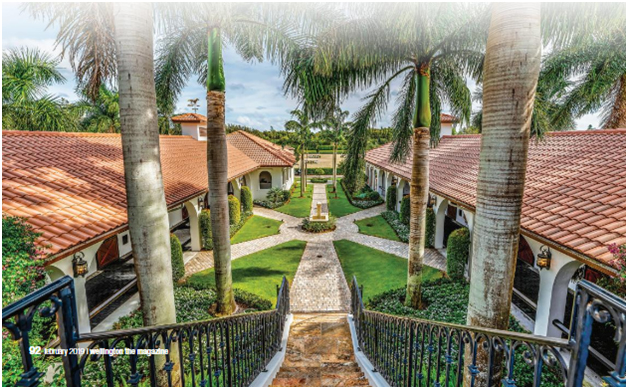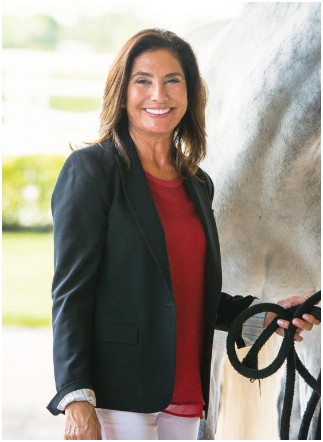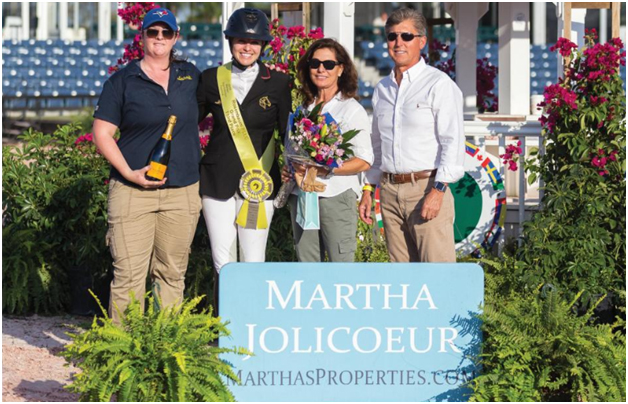The Evolution of a Market
An Interview with Wellington Real Estate Powerhouse Martha Jolicoeur
Martha Jolicoeur remembers when Wellington was a small community with big, equine-inspired dreams. It wasn’t always the winter horse show capital of the world, and Jolicoeur has witnessed its evolution. Even more, she has played a role in the growth.
An accomplished rider herself, Jolicoeur came to the crossroads of her amateur career in the competition ring and was drawn to a second passion. She obtained her real estate license in 1991 and is now a member of the elite Douglas Elliman Real Estate Sports & Entertainment Division with a distinguished reputation within the Wellington real estate market.

One of Martha Jolicoeur’s farm listings at 3490 Grand Prix Farms Drive in Grand Prix Village. Photo by Pagoda Photography.
Q & A :
Q : How long has your real estate business focused on the Wellington market?
A : I have been coming to Wellington since 1979. I stayed at the Palm Beach Polo Club for the first time that year, and I haven’t missed a season since. When I stopped riding, real estate became my competitive sport, because that’s how passionate I am about it. But specifically, my real estate business has been focused on the Wellington Market since 2005, after I got my license in Florida in 2004.
Q : How was the market different then than it is today?
A : When I started in Wellington, there was a boom in the market. You listed things, and they sold right away. I still feel that we have a very sound market, and more people are coming to Wellington than in 2005 because the horse show, dressage and the international aspects have all expanded. We are dealing with a larger base of people coming to Wellington looking to own property. The other thing that is positively affecting the market now are the tax advantages of being a Florida resident.
Q : What do you think the biggest change has been in real estate over the last decade?
A : Growth has been the biggest facilitator for a strong market in Wellington. The horse show has grown, and the array of people has grown. Before, people were renting more than buying, but today more people have bought because they realize the horse show is here to stay, and they spend more nights in Florida than anywhere else throughout the year. I would say that the majority of all equestrians have someplace to call home in Wellington.

Martha Jolicoeur at home and at work in Wellington | PHOTO BY ERIN GILMORE
Q : How have the types of properties changed over time?
A : There are always trends. For example, when I first started, I sold a lot of condos. The trend was, “What can you get for the least amount of money?” Then there were years where barns sold like cupcakes and large houses didn’t, as well as years where everyone wanted large houses independent of farms. Now, I feel like we have a nice mix. The market is good, and you really want to sell.
Q : How does the equestrian community within Wellington make the real estate market unique?
A: The horses! Without horses, it would not be the same at all. Wellington’s equestrian industry was founded by Bill Ylvisaker when he brought polo here. Without the horses it would, it would be the same as anywhere else in south Florida. It truly is the winter equestrian capital of the world, where everyone who speaks the same language or horse comes together. That gives it a real sense of community.
Q : What has the Wellington sales climate looked like over the last several years and where do you see it going?
A : It goes with the economy, so we have seen ups and downs. From 2008 to 2011, we had a pretty big recession and people were investing in real estate like it was the stock market. I think the market is healthy right now, but everyone in horses seeks different things for what they need. It’s interesting, because we have the same core group of people moving around. Perhaps they start here looking for a condo in Palm Beach Polo, and then they decide they would like to have a farm. Then they have a farm for a few years, and it’s time to go to the beach or scale down. But it’s the same group moving to different phases of their lives and businesses.

Martha Jolicoeur (right) and Dr. Stephen Norton (far right) present the first Martha Jolicoeur Leading Lady Rider Award of the 2019 Winter Equestrian Festival season to Tiffany Foster (left) and owner Ariel Grange (far left) in Wellington. Photo by Jump Media.
Q : What’s the most popular trend you have seen recently in home design?
A : When I first arrived in Wellington in 2005, the Mediterranean look was very big and every kind of brown and beige was it. Now, we have a much more scaled-down, simplified, Restoration Hardware genre where less is more, and the colors are lighter and more neutral. Clean and simple with an equestrian style is always a good theme.
Q : How do people best utilize the limited space on smaller Wellington farms?
A : It’s completely different than farms you see in other parts of the country. The key is meticulous maintenance so that you can use every square inch.
Q : Do real estate offerings in Wellington span the gamut of price ranges, size, etc.? Is there something for everyone?
A : Yes, there is something for everyone, and the market is healthy for everything now. Because so many people are relocating to Florida as permanent residents, large houses are becoming more popular again. People are really living here! The season is a very strong six months now versus three months. Also, people who compete with children often move here because school starts in August and finishes in May, so the schedule can match up nicely with the horse show schedule.
Q : How popular are equestrian facilities with no residential space in Wellington?
A : Many people used to want a farm in Grand Prix Village and a home in the Polo Club. That’s still popular, but what I have found recently with a lot of the people from Europe or more urban areas is that it has always been their dream to live with the horses. In both cases it’s like trying to convince someone to drink French chardonnay versus California – you are never going to change their minds. They pretty much know after renting for a few years what they want, which is what most people do to get a feel for the area.
Q : What’s your best advice to someone looking to buy or sell in the Wellington market?
A : To a buyer, I would say do the research. Take your time and watch the market to see what sells quickly. To a seller I would say do as much homework as you can. Clean up, touch up, landscape, perfect your lighting and remove personal items from your space. A buyer wants to walk in and envision themselves there.

